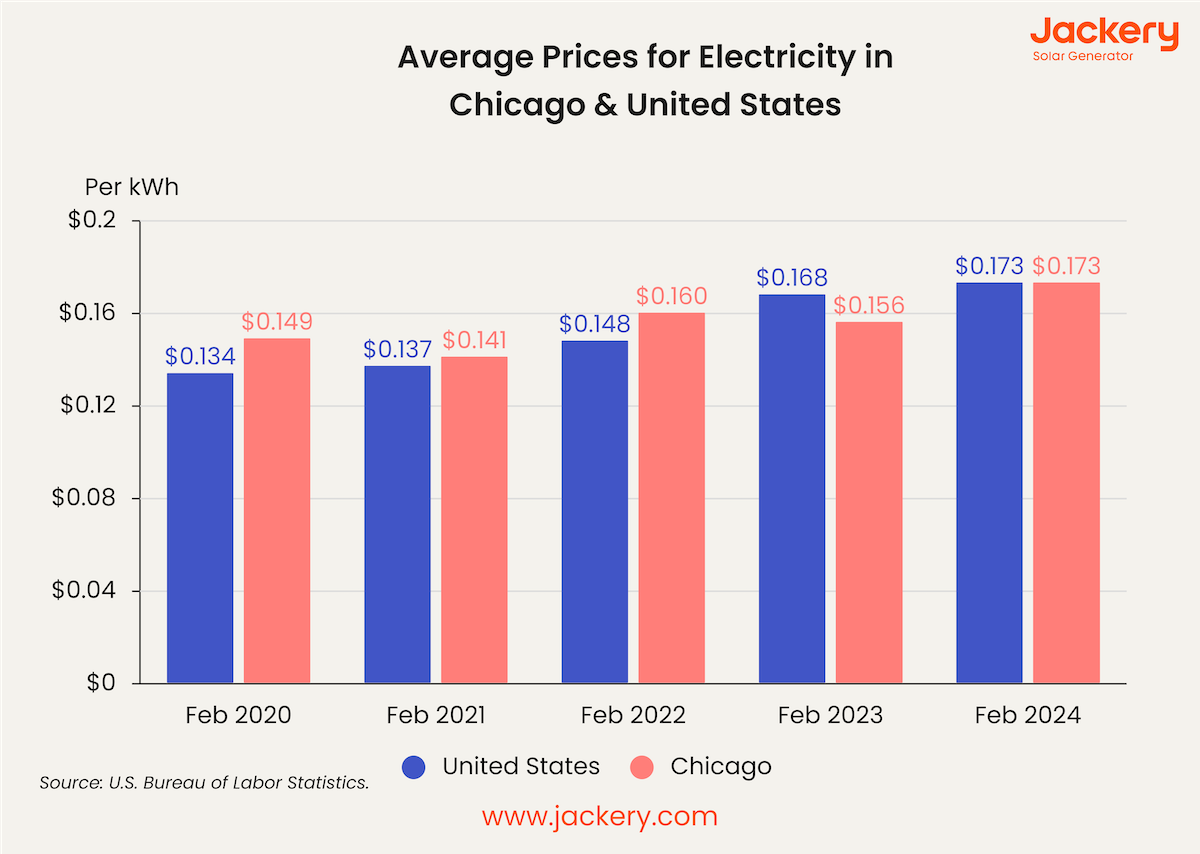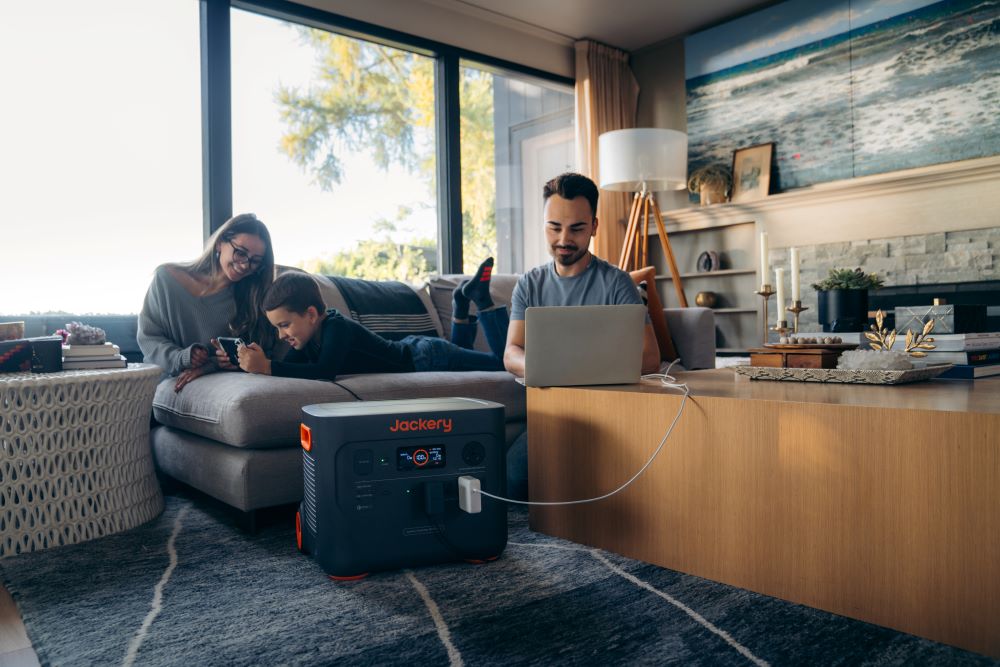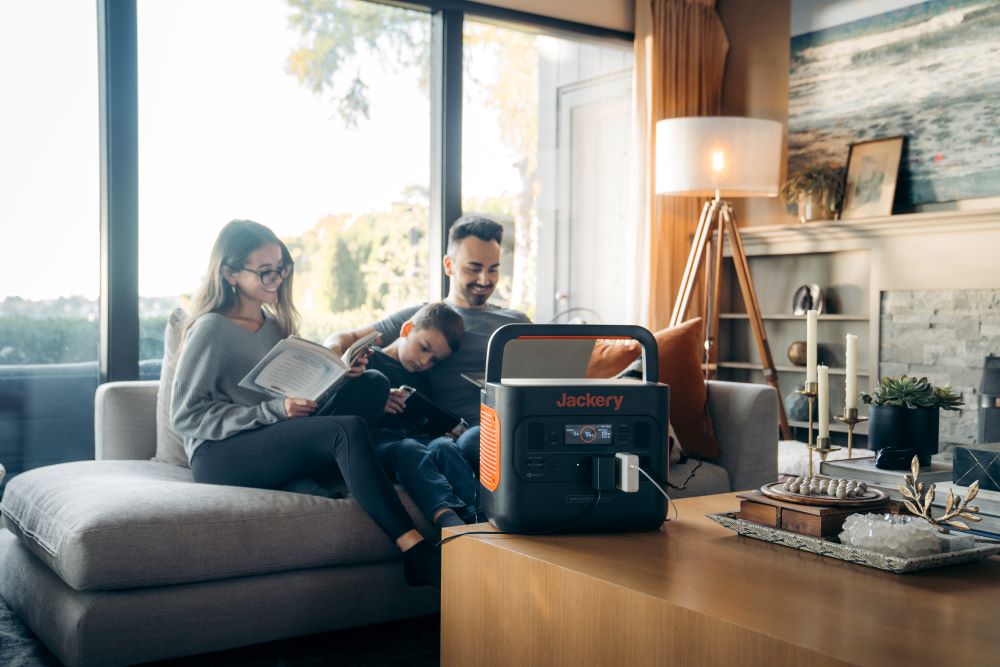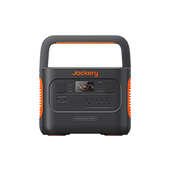Chicago, the largest city in Illinois, is home to over 2 million people. As of July 2024, the Chicago area's average electricity rate per kWh was 16.70 cents per kWh, up from 16.20 cents per kWh in July 2023. The increased rate has affected the average electric bill in Chicago and forced people to look for alternative options to lower their monthly utility bills.
Jackery Solar Generators are popular and environmentally friendly solutions for lowering your electricity bills and switching to clean energy. They work by converting free solar energy into usable AC electricity to charge a wide range of household appliances, including ACs, refrigerators, TVs, sump pumps, CPAP machines, and kitchen appliances.
What Is The Average Electric Bill in Chicago?
In July 2023, the electricity costs in Chicago were around 16.20 cents per kWh — which is much lower than the national average of 16.90 cents. As per the data by the U.S. Bureau of Labor Statistics, the average electric rate in Chicago increased to 16.70 cents per kWh in July 2024. The average electric bill in Chicago is $120.24, with a monthly usage of 720 kWh.
Over the past five years, electricity prices in the Chicago area have ranged from 14.1 cents per kWh to 17.6 cents per kWh. Here's a chart that compares the electricity rates of Chicago and the overall US from February 2020 to February 2024.

Source: U.S. Bureau of Labor Statistics
Electricity bills and power usage vary depending on the city or state. For example, Connecticut and Hawaii have the highest electricity bills, whereas New Mexico, Colorado, and Utah have less expensive rates. Here's a table comparing Chicago's average electric bill with that of other US states.
|
City / State |
Avg. Monthly Electric Bill |
Avg. Electricity Price |
Avg. Monthly Usage |
|
Chicago |
$120.24 |
16.70 ¢/kWh |
720 kWh |
|
Georgia |
$170.20 |
15.53 ¢/kWh |
1096 kWh |
|
Florida |
$154.31 |
13.89 ¢/kWh |
1111 kWh |
|
California |
$176.49 |
32.99 ¢/kWh |
535 kWh |
|
Hawaii |
$218.61 |
42.45 ¢/kWh |
515 kWh |
Source: EIA
What Are The Electric Rates in Chicago?
The electricity rate is the price at which electricity is supplied to the consumer. As of July 2024, the average electricity rate in Chicago is 16.70 cents per kWh. However, it may differ depending on the electricity provider you choose and the plan. There are many electricity providers working in the Chicago area, including NextEra Energy, AEP Energy, Public Power, FreePoint, etc.
They offer different plans that vary in contract length and rate. For example, NextEra Energy's 30-month plan costs $0.0684 per kWh, whereas its 24-month plan costs $0.0707 per kWh. ComEd is one of the largest utilities in Illinois, and it provides energy to Chicago and many parts of Northern Illinois. All Illinois residents can freely shop for electricity providers in Chicago.
Energy deregulation has increased competition among Chicago utility companies. Residents can save money on electric bills by shopping for energy rates in Chicago. The residential rate is high, around 19.17 cents per kWh, whereas the commercial electric rate is 16.70 cents per kWh.
Here are a few things to keep in mind when choosing the best electric rate in Chicago.
Your Electricity Needs: The first thing you need to consider is how much kWh you need per month. This will depend on the size of the apartment, the number of appliances you need, etc. Understanding these factors is essential because some plans have discounts after 1500 kWh consumption. So, if you draw less than 1500 kWh from the grid, it won't save you any money.
Contract Length: The most common contract lengths are 6, 12, and 18 months, and sometimes, plans for 24 months or longer are also available. The choice of the term will vary depending on how long you need the service.
Type of Rate: The two standard electricity rate types are fixed and variable. While fixed rates do not change over time, variable rates change based on the time of day, day of the week, month of the year, etc. If your electricity consumption varies throughout the day, you may consider a variable rate plan. On the other hand, if you want a basic and straightforward plan, choose a fixed-rate plan.
How Much Does It Cost to Live in Chicago?
The cost of living in Chicago significantly depends on utility costs, such as electricity, gas, Internet, water, sewer, garbage, etc. According to the U.S. Bureau of Labor Statistics, an average Chicago resident spends $5,629 annually on food and $27,212 on household rent.
Let's explain the cost of each utility in Chicago briefly.
Electricity: The average price of electricity in Chicago city is $120.24, with an average monthly consumption of 720 kWh. It may increase in the summer months when the AC is constantly running and in winter when space heaters are used to keep the home warm.
Gas: Chicago residents pay somewhere around $90 - $110 per month for gas. When the temperature falls, the gas bills rise to combat the extra costs due to the surge in electricity.
Cable & Internet: The average cost of Internet in Chicago is around $75, with $110 being the national average for cable. However, it may vary depending on the Internet speed. If you don't mind using slow Internet, you can lower the costs of monthly Internet.
Water: The national average bill of water is around $45, so you don't really have to worry about this cost in your Chicago home.
Sewer/Garbage: The city of Chicago charges nearly $10 per month as a garbage fee. However, it is most likely to be handled by the apartment building.
There are many factors affecting the cost of utility companies, including:
Property Type: Top-floor apartments and older-built homes consume different amounts of electricity. For example, the airy top-floor apartments have windows that let in lots of sunlight. This can heat your apartment, increase your cooling bills in summer, and reduce your heating bills. On the other hand, older-built buildings do not have any ACs installed, and hence, they use less energy.
Number of Roommates: More people in the apartment means higher average utility bills in Chicago. Sometimes, having more roommates means cutting utility costs in half by sharing the expenses.
Season: Chicago is best known for its cold, snowy winters. This means you are likely to pay higher heating bills. On the other hand, the warmth of summer months often increases the usage of air conditioners.
Provider: The utility and water prices also depend on the provider. While residents can get water from the city of Chicago, their gas and electricity bills are usually from private providers with different rates.
Features of Home: The electricity consumption for heating and cooling the home will depend on its features. If you want to reduce the high electricity bills, opt for smart thermostats, LED lights, and other energy-efficient gadgets.
Here's a table where we will compare Chicago's living costs with other cities in the US.
|
Utility |
Chicago |
New York |
Los Angeles |
Detroit |
|
Electricity |
$120.24 |
$145.09 |
||
|
Water |
$45 |
$40 |
$77-$84 |
$29 |
|
Gas |
$90 - $110 |
$100 |
$409 |
$74 |
|
Cable & Internet |
$75 / $110 |
$70.21 |
$9.99 |
$30 |
Note: Remember, these are the average costs and may be higher or lower depending on utility usage, location, amenities, and apartment size.
Why Is My Electric Bill So High in Chicago?
If you are getting a higher-than-expected bill from the utility company, it is essential to check the potential reasons that can affect the average electric bill in Chicago. Here are a few of them:
Electric Rate
The electricity rate fluctuates across Chicago and typically increases over time. As the cost you pay for electricity continues to rise, it will lead to high electricity bills even if you are not using more electricity.
Older Appliances
Over time, home appliances can degrade and lose their efficiency. If you have a lot of older appliances at home, it will lead to higher electricity bills. You can consider replacing them with Energy Star appliances that draw less electricity and are more efficient.
Changes in Weather and Seasons
Home appliances like air conditioners work harder on hot days, and heaters run nonstop during cold days. Your electricity bill will likely be higher during the summer or winter months.
Inadequate Insulation
In extreme cold months, air can leak through windows and doors, making it hard to heat the home in winter. Similarly, cold air can leak, making it hard to cool the room during the summer season. As a result, poor insulation can cause high electric bills.
How to Calculate My Electric Bill in Chicago?
If you want to calculate the electric bill per month manually, the first step is to understand how much kWh each electric appliance consumes. Here are the steps you need to follow:
List the Home Appliances You Use
The first step is to create a list of household appliances with their wattage and monthly use. You can typically find the wattage on the product. If you can't find the watts directly, use the formula mentioned below:
The most common household appliances that use a lot of electricity include:
- HVAC systems
- Air conditioners
- Space heaters
- Refrigerators
- TVs
- Dishwashers
- Laundry machines and dryers
- Electric ovens and stoves
- Water heaters
Calculate the Electricity Consumption of Each Appliance
The simple formula to calculate the electricity consumption of each appliance is multiplying appliance wattage and estimated monthly usage (in hours). For example, if you are using a 100 W TV for 30 hours per month, the total electricity consumption will be 100 W × 30 H = 3000 Wh. Then, you can convert the watt-hour into kilowatt-hour by dividing the watt-hour by 1000. In this case, 3000 Wh will be 3000 Wh ÷ 1000 = 3 kWh.
Calculate the Total Kilowatt-hour Consumed
The last step is to add the kWh consumption of all the household appliances you will use at home. The result will be the electricity consumed per month in your Chicago home. For example, if the monthly consumption of your home is 700 kWh, the electricity bill in Chicago will be $116.90 per month.
Jackery Solar Generators for Lowering Your Electric Bills
Jackery is a well-known solar brand that manufactures and sells high-quality solar generators, solar panels, and power stations. The Jackery Solar Generators are great off-grid solutions that combine portable Jackery Explorer Portable Power Stations and foldable Jackery SolarSaga Solar Panels.
They work when the sun's rays fall on the monocrystalline silicon solar cells of the Jackery SolarSaga Solar Panels and convert the direct sunlight into DC electricity. This current is passed through the Jackery Explorer Portable Power Stations, where the pure sine wave inverter converts the DC electricity to AC.
You can then plug the household appliances into the battery backup to start charging them anytime, anywhere. Thus, it helps you reduce the monthly average electric bills in Chicago by lowering the reliance on the utility grid.
Jackery Solar Generator 3000 Pro
If you want a battery-powered generator that can power most household appliances and significantly reduce electricity bills, you may consider the Jackery Solar Generator 3000 Pro. Equipped with an NMC battery of 3024 Wh, this battery backup for home can charge 99% of household appliances in Chicago.

|
|
Solar Generator 3000 Pro |
|
Capacity |
3024 Wh |
|
Battery Cell |
NMC |
|
Cycle Life |
2000 cycles to 70%+ capacity |
|
Recharging Methods |
Solar Recharging: 3.5 H (6*Jackery SolarSaga 200W Solar Panels) Car Recharging: 35 H Wall Recharging: 2.4 H |
|
Output Ports |
AC Output (x1): 120 V~ 60 Hz 25 A Max AC Output (x3): 120 V~ 60 Hz 20 A Maximum USB-C Output (x2): 100 W Maximum, 5 V⎓3 A, 9 V⎓3 A, 12 V⎓3 A, 15 V⎓3 A, 20 V⎓5 A |
|
Working Hours |
Microwave (1050 W): 2.4 H Kettle (850 W): 3 H AC (1000 W): 2.5 H Coffee Maker (550 W): 4.6 H Electric Oven (800 W): 3.2 H Refrigerator (500W): 5.1 H |
|
Customer Review |
“I purchased this as a second option to run the fridge and upright freezer if the power goes out. It can be used at night with no noise or fumes. I can run both for about 22 hours on a full charge.”—Tim W. |
Jackery Solar Generator 2000 Plus
If you are unsure what size solar generator you need for your Chicago home, the Jackery Solar Generator 2000 Plus might be a good choice. It has a LiFePO4 battery of 2042.8 Wh capacity and can be expanded from 2 kWh to 24 kWh with an additional Jackery Battery Pack 2000 Plus to support long hours of charging.

|
|
Solar Generator 2000 Plus |
|
Capacity |
2-24 kWh |
|
Battery Cell |
LiFePO4 |
|
Cycle Life |
4000 cycles to 70%+ capacity |
|
Recharging Methods |
Solar Recharging: 2 H (6*Jackery SolarSaga 200W Solar Panels) Car Recharging: 25 H Wall Recharging: 2 H |
|
Output Ports |
AC Output (×4) 120 V~ 60 Hz, 20 A Maximum AC Output (×1) 120 V~ 60 Hz, 25 A Maximum USB-A Output (x2): Quick Charge 3.0, 18 W Maximum USB-C Output (x2): 100 W Maximum, (5 V, 9 V, 12 V, 15 V, 20 V up to 5 A) |
|
Working Hours |
Microwave (1050 W): 1.6 H Kettle (850 W): 2 H AC (1000 W): 1.7 H Coffee Maker (550 W): 3.1 H Electric Oven (800 W): 2.1 H Refrigerator (500W): 3.4 H |
|
Customer Review |
“It's got a lot of power. It powered my air conditioner on high. It powered power tools. It's really not that heavy. It doesn't take too long to charge.” — Michelle H. |
Jackery Solar Generator 2000 Pro
The Jackery Solar Generator 2000 Pro is a portable battery-powered generator that can charge 96% of household appliances. Its 2160 Wh NMC battery can power small to midsize appliances, including refrigerators, ACs, space heaters, LED lights, and more. You can fully recharge the battery backup in only 2.5 hours using 6*Jackery SolarSaga 200W Solar Panels.

|
Jackery Solar Generator 2000 Pro |
|
|
Capacity |
2160 Wh |
|
Battery Cell |
NMC |
|
Cycle Life |
1000 cycles to 80%+ capacity |
|
Recharging Methods |
Solar Recharging: 2.5 H (6 * Jackery SolarSaga 200W Solar Panels) Car Recharging: 24 H Wall Recharging: 2 H |
|
Output Ports |
USB-A Output (x2): Quick Charge 3.0, 18 W Maximum AC Output (x3): 120 V, 60 Hz, 2,200 W (4,400 W Surge Peak) USB-C Output (x2): 100 W Maximum, (5 V, 9 V, 12 V, 15 V, 20 V up to 5 A) |
|
Working Hours |
Microwave (1050 W): 1.7 H Kettle (850 W): 2.1 H AC (1000 W): 1.8 H Coffee Maker (550 W): 3.3 H Electric Oven (800 W): 2.2 H Refrigerator (500W): 3.6 H |
|
Customer Review |
"Very nice, powerful unit that is super easy to use and fast charging. Have powered several appliances in the house." -- Richard W.. |
Chicago Average Electric Bill FAQs
What size of solar generator do I need for my house in Chicago?
The solar generator size that is right for your Chicago home will depend on the number of electrical appliances you are charging at the same time and for how long. For example, suppose you are charging a refrigerator (500 W), AC (1000 W), and TV (100 W) at the same time using the Jackery Solar Generator 3000 Pro. The working hours of the solar generator can be calculated using the below formula:
Working Time = Battery Capacity in Wh × 0.85 / Wattage Consumption of Appliances = 3024 Wh × 0.85 / 1600 W = 1.6 H.
Note: The capacity of the solar generator is multiplied by 0.85 since there will be some power loss while charging the appliances.
How much is the average monthly gas in Chicago?
The average gas price in Chicago is nearly $97 per month. However, this number can fluctuate significantly throughout the year.
How much is a typical water bill in Chicago?
The typical water bill in Chicago is $40 per month. Similar to the gas bills, these numbers fluctuate based on the size of the condo and other variables.
How much is the electric bill for a 2-bedroom apartment in Chicago?
The average monthly electric bill for a 2-bedroom apartment in Chicago can range between $50 and $100, depending on the usage and efficiency of the appliances.
Is Chicago's cost of living high?
The cost of living in Chicago city is nearly 20% higher than the national average.
Final Thoughts
Chicago is a great place to live. However, the high average electric bill in Chicago can be a matter of concern. If you are living in Chicago and worrying about the high monthly bills, it's best to invest in free and renewable solar energy. Jackery Solar Generators are reliable solutions that can charge most household appliances for long hours. For example, the Jackery Solar Generator 3000 Pro is designed to support the charging of 99% of appliances, including refrigerators, ACs, space heaters, LED lights, etc., to reduce the high electricity bills in Chicago.












































































































![What Is The Average Electric Bill in Chicago [2024 Updated]](http://www.jackery.com/cdn/shop/articles/average_electric_bill_in_chicago_by_jackery.jpg?v=1712885800)







Leave a comment